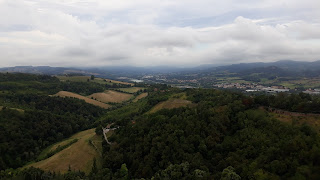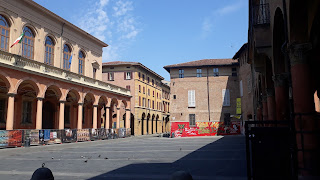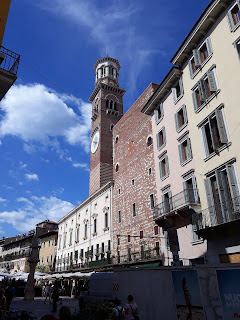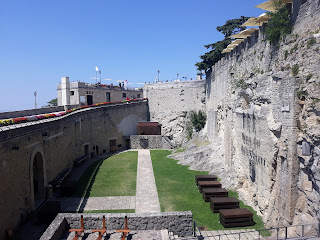 |
It proved to be a good choice for this strange Covid summer
as there was no quarantine required, Italy was over the worst of the spring
pandemic and seemed to have some of the best numbers in Europe. Also restrictions
were similar to England in the summer so it was almost home from home.
I wasn’t able to get a flight from my local airport,
Gatwick, and ended up flying with Ryanair from Luton, where I parked my car for
£55.96 for eight nights.
I stayed in a terrific accommodation just a few minutes walk
south of the city centre. Situated in a classic old apartment building with
ancient elevator to the third floor it was as much as you could expect for just
over £50 per night, large, spotlessly clean with a big ensuite bathroom and
walk in shower, stamped with Italian style. You accessed the building by
punching in a code on the pad by the main door, and used the same code to
access the relevant lobby area upstairs with its reception desk and the door to
one’s own relevant room.
 |
| Splendid accommodation |
On my first night on arrival at the building I couldn’t access the email on my phone with the relevant entry code, so was forced to find wifi in the city centre to get said access. That meant ending up in McDonalds and killing two birds with one stone with a welcome meal. Getting into the apartment and following the email instructions still took a while, amusement being provided by a large insect of the cricket variety sitting squarely on the elevator button and refusing to move.
Bologna is the city of porticos, a wonderful architectural inclusion in this very well-preserved medieval city. These covered walkways or pavements are all over the centre of the city and mean that you can avoid the beating sun or the pounding rain on your shopping expedition. No doubt you can cross the city north south or east west with hardly a break in the snaking porticos. And Bologna has the daddy of all porticos, the longest portico in the world snaking out of the city and up the hill beyond the Bologna football stadium to the the Santuario di Madonna di San Luca church at the top of the hill. There are so many locals in sports gear running up to the top that it’s more of a marathon workout than religious pilgrimage. It was hard work just walking up! Well worth it however as you get marvellous views from the top over the verdant, green hills above the city.
 |
| Longest portico in the world |
 |
| View from the top of the hill |
 |
| Santuario di Madonna di San Luca church |
The centre of the city is the expansive Piazza Maggiore, flanked by the cathedral or duomo, civic buildings and porticoed shops and restaurants. In this L shaped space we also have the Fountain of Neptune statue, an excellent photo op. The Basilica di San Petronio dominates the square as all self -respecting cathedrals should, and it’s a whopper inside as well with typically Italian embellishment and a full set of side chapels, as well as housing the largest sundial in the world. One of the chapels sports a huge frieze/painting of Mohammad in hell. No wonder that there have been a couple of Islamic terrorist incidences aimed at this building. Indeed while I wandered past outside one day, a large policeman had turned up to quiz a couple of middle easterners outside the main entrance. I heard the word ’Iran’ from one of the students, the next thing I knew the two students were walking off. The square outside is decked with open air seating and at night time in the summer they show classic films on a massive screen in the square, a great way to end your day.
 |
| Mohammad in hell |
 |
| Neptune statue |
Alongside the Basilica is the Archeological museum, and also
the Teatro Anatomico, a wonderful wood decorated medical lecture theatre where
anatomy lessons were once held.
 |
| Anatomical theatre |
No trip to Bologna would be complete without ascending the Torre
degli Asinelli, a skyscraper standard ancient tower (97.2m) dominating the
centre of Bologna. It is one of the ‘Two Towers,’ which is the iconic symbol of
Bologna. These two sisters are left over from an amazing surfeit of towers,
over 200, from the 12th century. It’ll test you though, getting to
the top, only 498 steps but it helps to be quite fit. And just a reminder, it leans
a noticeable 1.3 degrees off centre! They did plan to install lifts on three
occasions going back to 1887 but it never happened. Pilots placed bets in the Second
World War to see who would be the first to topple the tower. Fortunately they
never succeeded. The view is terrific, a sea of red, terracotta tiled roofs and
beautifully delineated streets in all directions, the city pushed up against
verdant green hills along one side, stretching out into the plain on the other.
 |
| View from tower |
 |
| Another view |
Other city highlights are the underground waterways that were open canals until two centuries ago. Now it looks like Little Venice. Get there from Via Zamboni going towards Via Independenza. There’s also the former Jewish ghetto quite nearby to wander through. Just off Via Independenza and before reaching the railway station is the park of Montagnola, a nineteenth century circumference of tree lined parkland with statues, a fountain and cafes, a great spot to escape the heat. Back towards Piazza Maggiore is another daddy of a church, the cathedral of San Pietro.
 |
| Little Venice! |
Bologna is a well-known hotbed of left wing politics and was under a communist mayorality from 1945 to 1993. Bologna ‘The Fat’ is one of its titles and no surprise there with its abundance of café and restaurant culture and reputation as the birthplace of Bolognese, although the ragu sauce is different from the variety found worldwide. The Quadrilatero area near Piazza Maggiore is the place for foodies with its narrow streets of the old city markets and food stalls.8
 |
| Santuario di Madonna di San Luca church |
Watch yourself in Bologna, especially out in public keep your wallet well hidden and be very aware of Africans continually begging for food or money. I was pestered by one guy whilst at a restaurant who wanted me to help him get to England. I tried to dissuade him from this and ended up buying him a fresh chicken for less than 5 euro, a new one for me. Normally it’s a sandwich!
Bologna railway station is a major rail hub with lines
splaying out in all directions to many delightful destinations of Italian
culture, and the great thing is you can travel there and back in a day. You can
even do Sienna but that’s a 3 and a half hour trip each way. It was a 20/25
minute walk from my accommodation, porticos most of the way via Via del’Independenza,
the main shopping street. It’s well known also for a terrorist attack at the
station on the 2nd August 1980 which left a huge death toll of 85
with 200 wounded. You can’t stay for long in the city without coming across the
memory of this atrocity.
Destinations from Bologna include Verona for which I bought
the fast train ticket setting me back 26.50 euro one way (10.30 the other way
on the slow train). Rimini was 9.85 euro, Modena 3.85euro and Parma (of ham
fame) 7.35 one way prices. Don’t forget to validate your tickets by inserting
them into the punch machines which can be found in station concourses or on the
platform. I forgot to punch mine on one occasion, or rather punched the wrong
ticket, an old one, but survived the journey without any checks. You have to
watch it though as fines can be issued for unvalidated tickets.
 |
| Verona centre |
I’d never visited Verona before but was suitably impressed by this elegant medieval town. It’s a bit of a walk from the railway station to the centre, so factor this in to make sure you catch your train in the evening. The first sight you see opposite the tourist information, is the Arena, the Roman amphitheatre, a truly spectacular and incredibly well preserved stadium which is still used for entertainment (entry 7.50 euro including senior discount). You can wander freely up and down the bleachers, right to the top for some skyline views, and also do the oval underneath the stands where there are presentations on the history of the arena. Then there’s the Shakespeare connection on Via Cappello. I actually had to queue up for the Romeo and Juliette balcony, even in these Covid times, a constant stream of snap happy tourists filing into the yard to take pictures of the famous spot. There’s a shop and museum that you can rip round pretty quickly giving you the opportunity to pop out onto the balcony, which I briefly did with mask on, but not the romantic type of mask. There seemed to be plenty of snappers below but I wasn’t the one they were waiting for! Once you leave the Romeo and Juliette experience you can wander through the deliciously evocative main town square, the Piazza Erbe, medieval Italy in a nutshell, and then head for the river a bit of a walk away. On the way you can visit the Basilica of St Anastasia (entrance fee euro 3), the largest church in Verona.
 |
| Various arena views |
You can take the bridge over the river (Fiume Adige) and then get the funicular (1 euro) up to the top of the hill where I found a cool bar to admire the views over Verona. There’s also a nice promenade viewpoint over the skyline where you can take a romantic stroll or just go snap happy with your smart phone.
 |
| Verona across the river |
Modena proved to be far more than its connections to the Ferrari and Maserati brands. The town centre is an easy walk from the rail station and can be reached by the arresting and expansive Piazza Roma fronted by the Palazzo Ducale. As with all these visits, the town centre was beautiful, with an elegant square, the Piazza Grande, cathedral with its Torre Ghirlandina bell tower that can be ascended for a small fee of euro 3 giving great views over the area. I ended up at a balsamic vinegar talk which I booked at the town tourist office in the Palazzo Comunale, only trouble was it was all in Italian! The only meaningful part was a couple of small samples which were truly delicious, but I understand the real mccoy is very expensive, like liquid gold, not your average supermarket bottle. Fortunately there was a young Italian couple there who I had met earlier at the tower and the guy provided a translation for me at the end. I wound my way back to the station in the evening via the Palazzina dei giardina, a town park with a welcome open air café where I enjoyed ice cream and a beer.
 |
| View from the tower |
 |
| Modena cathedral |
Z
 |
| Modena square |
Parma is another town with some wonderful architecture that
has far more to it than ham and cheese! The food is a sideshow to the
impressive squares and churches crammed into this gem of a town which has been
the elected Italian Capital of Culture 2020. On the edge of the centre is a
colossal old brick edifice, the Pilotta Palace (1583 vintage), with a walkway
through the middle at ground level which houses the rambling museum Archeologico,
a fine old wooden theatre, the Teatro Farnese and the Galleria Nazionale. Meanwhile
the tourist information office lies on the impressive Piazza Garibaldi which
seemed to be the commercial hub of the town. A quieter, more historic and no less
impressive square is the Piazza Duomo with its unusual Battistero tower which
looked like an upended Vienneta ice cream bar. I did partake of the local fare
by lunching at a square side café. The cheese was tasty although the overblown
sandwich was somewhat on the dry side.
 |
| Theatre at Parma |
 |
| Battistero tower |
Over the river, the Torrente Parma, lies the Parco Ducale, where everyone evidently goes for their evening stroll, promenade or outdoor coffee and ice cream. It’s big enough to get lost in, with an ornamental lake at the far end and plenty of benches for a nap or rest.
Rimini is a large Adriatic resort to the south east of Bologna
reached by a dead straight rail route across what must be the coastal plain. It
is described by Wikipedia as one of the most notable seaside resorts in Europe with
15km of beach and is quite a sizeable settlement of about 150,000,. having been
established originally in 268 BC as Ariminum. It must be the go to resort for
the Bolognese at the weekend being only about an hour away. Alighting at the
rail station, it’s still quite a walk to the beach, which proves to be well
busy and the equivalent of an Italian Bournemouth. Again give yourself plenty
of time and don’t be caught out returning to the rail station in the evening.
Also don’t just hit the beach with your swimmers as the town centre is a bit of
a surprise with beautiful old architecture and well worth a wander. I meandered
through the Piazza tre Martiri and ended up in a lovely square, the Piazza
Cavour with a nice restaurant to while away an hour or two. A little further
walk took me to an old castle, the Castel Sismondo sitting on the edge of the
town centre.
 |
| Entrance to town hall |
 |
| Heights of San Marino |
 |
| Council chamber |
At the top of the town you can enter the compound of one of the three towers that magisterially dominate the rocky skyline, like basking cats atop a giant sofa back. One ticket for euro 10.50 gives you access to two towers (Rocca and Cesta), the Public Palace which includes the council chamber, the State museum, the National Gallery of Modern and Contemporary Art (a bit of a disappointment!) and the St Francis art gallery. Being a local councillor myself, it was interesting to see the council chamber here, somewhat more Italianate and ornate than my south coast chamber, with a huge colourful painting dominating the scene.
 |
| San Marino tower |
 |
| And again |
Another grim addition to your visit is the Museo dela Tortura which exhibits torture instruments through the ages, a pretty ghastly testimony of man’s inhumanity to man. Makes you grateful that we live in our own time. Despite the Covid constraints impinging on our freedoms and livelihoods we really do have it easy compared with the bloodthirsty past of our ancestors.
Practicalities
Accommodation:
Attico di via D’Azeglio di Alessandro Bini & C. SAS
R.E.A.: Bologna n. 547194
Via D’Azeglio 51
40123Bologna BO
direzione@atticodiviadazeglio.it
P.IVA: 03797701202 C.F.: 03797701202
I caught a taxi from the airport to my accommodation. I think it cost about 20 euro. The airport is very close to the city, very much within the city limits. You can get an airport bus from the rail station on departure.















